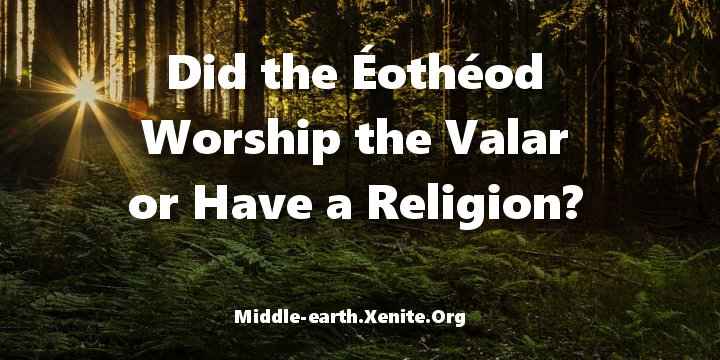
Did the Eotheod Worship the Valar or Have a Religion?
ANSWER: It is difficult to find references to anything like religious beliefs or practices in The Lord of the Rings. In Letter No. 142, written to Father Robert Murray, J.R.R. Tolkien noted:
…The Lord of the Rings is of course a fundamentally religious and Catholic work; unconsciously so at first, but consciously in the revision. That is why I have not put in, or have cut out, practically all references to anything like ‘religion’, to cults or practices, in the imaginary world. For the religious element is absorbed into the story and the symbolism.
In a draft of a letter (No. 153) intended for Peter Hastings, Tolkien said of the story that “Its economics, science, artefacts, religion, and philosophy are defective, or at least sketchy.” However, his most definitive statement on religion appears in a footnote from the same draft:
* There are thus no temples or ‘churches’ or fanes in this ‘world’ among ‘good’ peoples. They had little or no’religion’in the sense of worship. For help they may call on a Vala(as Elbereth), as a Catholic might on a Saint, though no doubt knowing in theory as well as he that the power of the Vala was limited and derivative. But this is a ‘primitive age’: and these folk may be said to view the Valar as children view their parents or immediate adult superiors, and though they know they are subjects of the King he does not live in their country nor have there any dwelling. I do not think Hobbits practised any form of worship or prayer (unless through exceptional contact with Elves). The Númenóreans (and others of that branch of Humanity, that fought against Morgoth, even if they elected to remain in Middle-earth and did not go to Númenor: such as the Rohirrim) were pure monotheists. But there was no temple in Númenor (until Sauron introduced the cult of Morgoth). The top of the Mountain, the Meneltarma or Pillar of Heaven, was dedicated to Eru, the One, and there at any time privately, and at certain times publicly, God was invoked, praised, and adored: an imitation of the Valar and the Mountain of Aman. But Numenor fell and was destroyed and the Mountain engulfed, and there was no substitute. Among the exiles, remnants of the Faithful who had not adopted the false religion nor taken pan in the rebellion, religion as divine worship (though perhaps not as philosophy and metaphysics) seems to have played a small part; though a glimpse of it is caught in Faramir’s remark on ‘grace at meat’ Vol. II p. 285.
Tolkien clearly states that the Rohirrim were “pure monotheists”. In his view they believed in one God (Iluvatar) and apparently understood that God had servants whom Tolkien equated with angels. The only mannish name for any of the Valar is Béma, which appears to be derived from Greek for a seat or platform used for religious purposes (or judgment).
I don’t know of any linguistic texts that attempt to explain Tolkien’s use of the Greek word as a proper name (among undisclosed men) for Orome the Vala. Tolkien associated the name with the sound of his hunting horns.
It seems that Tolkien would have the reader infer that peoples like the Éothéod (and their descendants the Rohirrim) acknowledged the existence of God and his Emmisaries but lacked any formal relationship with either. The Numenoreans had a relationship with the Valar and also formally acknowledged God in a special ceremony in which they gave thanks for their harvests and good fortune.
Formal rules of worship were yet to be introduced into Middle-earth, except according to the blasphemous “heathen” religions and cults introduced by Sauron in the Second Age. In Morgoth’s Ring Christopher Tolkien shares an ancient Edainic tradition about the fall of Men, in which Morgoth pretends to be God and demands that they worship him. So Morgoth is associated with all false cults, which Sauron revived.
Hence, it seems safe to say that the Éothéod did not worship the Valar, although if they understood who the Valar were they would have revered them as very powerful beings and emissaries of the one true God. It also seems fair to say that the Eotheod did not practice any cult or religion, but they probably believed in the spirits of Men (and Elves) as real aspects of their existence.
It is also plain from the Rohirrim’s practice of burying their kings in special barrows that they practiced funerary rituals which may have reflected a sense of passage from one stage of existence to another, perhaps to the care of a greater being. However, funerals are also a mourning process and we must be careful not to read too much beyond the practice of mourning a beloved leader and experiencing that loss in a healthy way.
See Also:
How did the Éothéod differ from the Rohirrim?
How Many Lords of Éothéod Were There?
Where did the Rohirrim Come From?
# # #
Have you read our other Tolkien and Middle-earth Questions and Answers articles?

[…] Did the Eotheod Worship the Valar or Have a Religion? […]